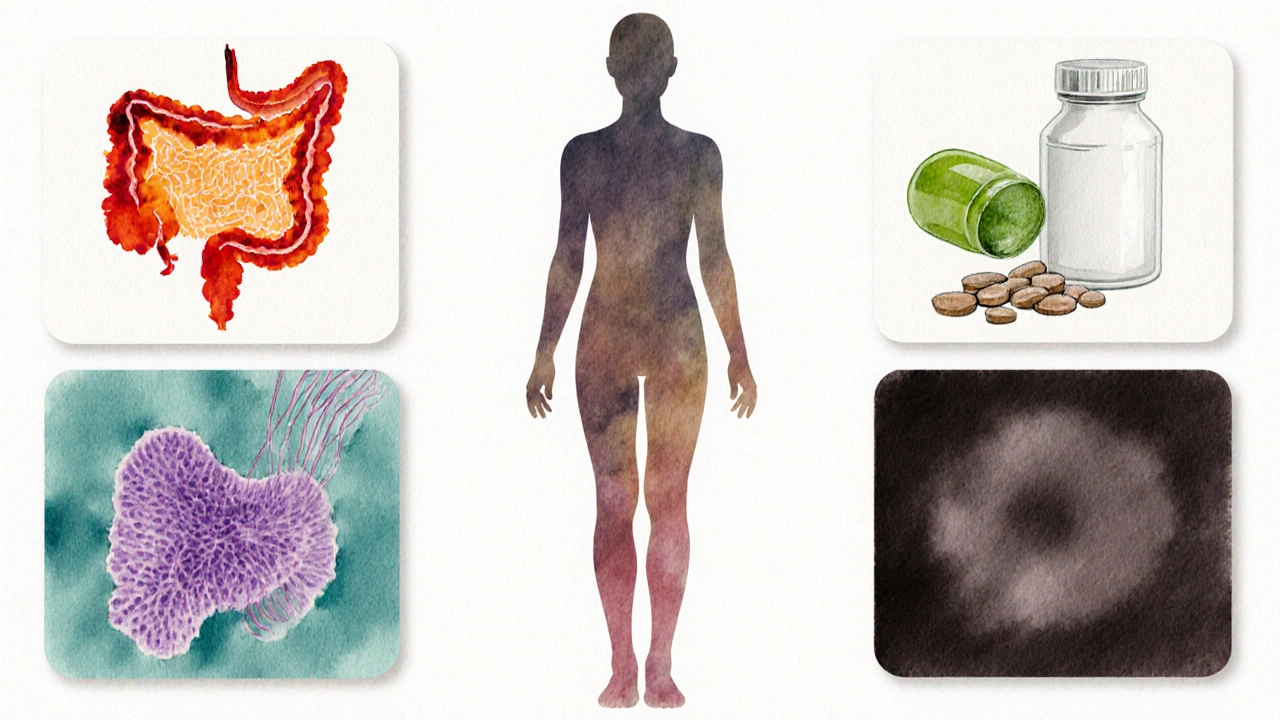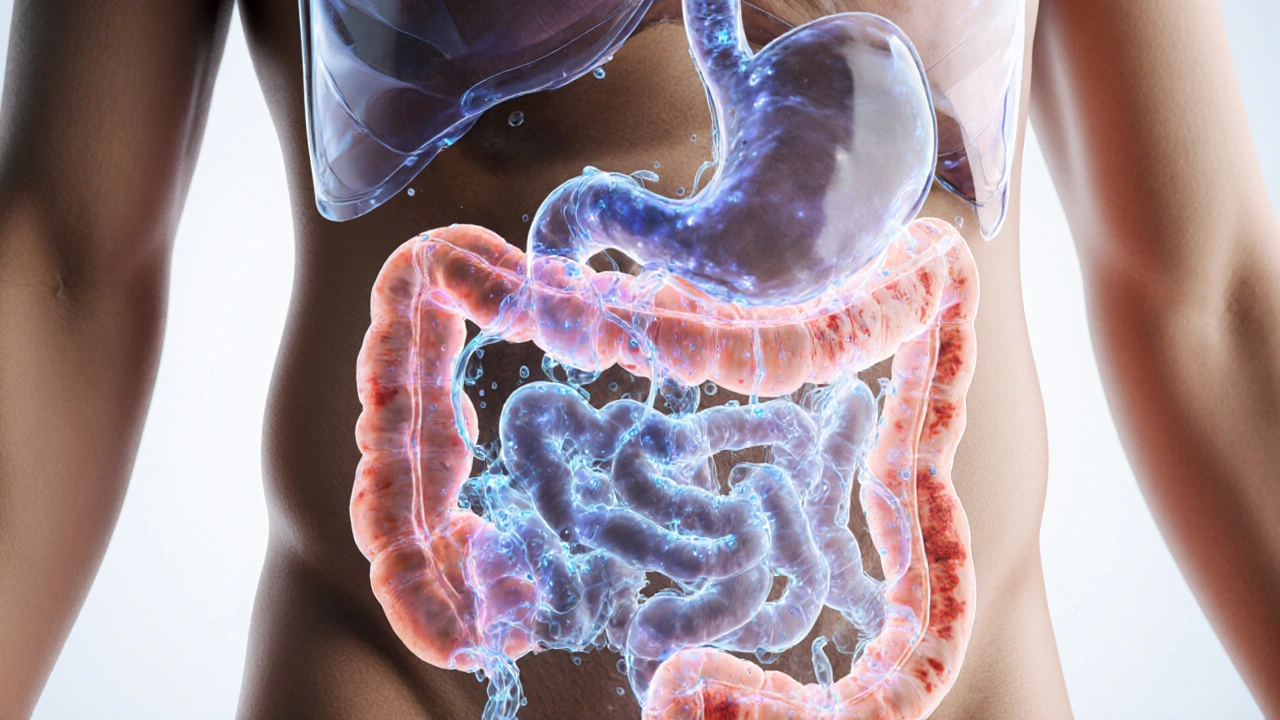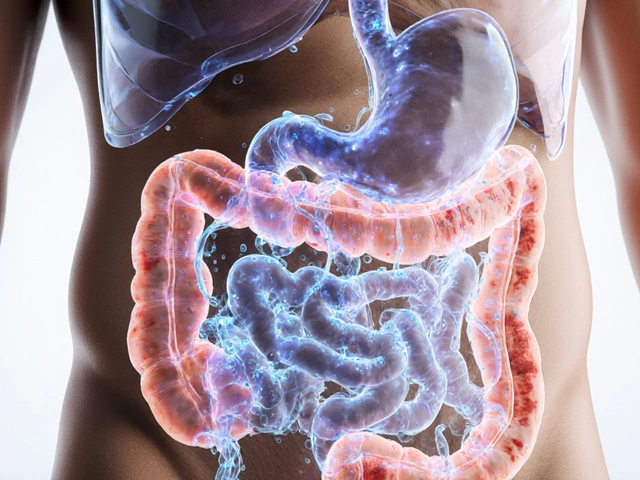Chronic Diarrhea & Weight Loss Calculator
Estimated Weight Loss
Enter values and click calculate to see estimated weight loss.
How this works: Based on physiological principles, each liter of stool can contain 100-200 calories. Multiply by days and divide by 7,000 calories per pound to estimate weight loss.
Quick Takeaways
- Persistent loose stools can steal calories, fluids, and nutrients, leading to measurable weight loss.
- Underlying conditions include infections, inflammatory bowel disease, medication side effects, and hormonal disorders.
- Early labs and stool testing reveal clues such as malabsorption, electrolyte loss, and hidden blood.
- Rehydration, targeted diet changes, and treating the root cause usually reverse the weight loss.
- Seek medical help if diarrhea lasts more than two weeks, you lose more than 5% of body weight, or notice blood or severe pain.
What Is Chronic Diarrhea?
When a person experiences watery or loose stools for more than four weeks, clinicians label it chronic diarrhea is a prolonged disturbance of bowel function that results in frequent, watery bowel movements and often disrupts normal nutrient absorption. Unlike an occasional upset stomach, chronic diarrhea signals that the gut’s normal balance-motility, secretion, and absorption-has been disturbed for an extended period.
Two key features set it apart from acute episodes: duration (≥4weeks) and the fact that it usually points to an underlying disease rather than a one‑off infection.
How Does Chronic Diarrhea Lead to Weight Loss?
The link isn’t magic; it’s physiology. Three main pathways drive weight loss:
- Calorie loss through stool volume. Every gram of stool contains undigested food and fluids. If you’re losing 6-8liters of liquid stool a day, you’re also losing a significant amount of calories.
- Malabsorption. The intestinal lining may be damaged, preventing nutrients like fats, proteins, and carbohydrates from being absorbed. This is often described as malabsorption a condition where the small intestine can’t effectively extract nutrients from digested food.
- Electrolyte and fluid depletion. Ongoing loss of sodium, potassium, and magnesium forces the body into a catabolic state, breaking down muscle protein for energy.
Combined, these mechanisms can shrink body weight by 5-15% within weeks if the diarrhea isn’t addressed.
Major Medical Causes That Pair Diarrhea With Weight Loss
Not all chronic diarrhea is created equal. Some causes are notorious for causing rapid weight loss, while others may produce milder effects. Below is a snapshot of the most common culprits.
- Inflammatory bowel disease (IBD) a group of chronic inflammatory conditions of the gastrointestinal tract, primarily Crohn’s disease and ulcerative colitis - Inflammation damages the mucosa, leading to malabsorption and fever‑driven catabolism.
- Infection gastrointestinal infection caused by bacteria, viruses, or parasites that disrupt normal bowel function - Parasites like Giardia or bacteria such asCampylobacter can cause chronic watery stools and nutrient loss.
- Medication side effect certain drugs (e.g., antibiotics, laxatives, chemotherapy) that alter gut motility or flora - Long‑term use of metformin, proton‑pump inhibitors, or chemotherapy agents often precipitates diarrhea.
- Endocrine disorders conditions such hyperthyroidism or Addison’s disease that affect metabolism and gut transit - Excess thyroid hormone speeds up intestinal transit, leaving less time for absorption.
- Gut microbiome imbalance dysbiosis, where harmful bacteria outgrow beneficial ones, impairing digestion - Overgrowth ofClostridioides difficile can cause profuse watery stools.
- Malignancy cancers of the colon, pancreas, or small intestine that obstruct or secrete fluids - Tumors may produce secretory diarrhea and cause cachexia.

When to Seek Medical Attention
Because weight loss can quickly become dangerous, use these red‑flag checkpoints:
- Diarrhea lasting >2weeks without improvement.
- Unintentional weight loss >5% of body weight (e.g., 10lb for a 200‑lb adult).
- Visible blood or mucus in stool.
- Severe abdominal pain, fever, or night sweats.
- Signs of dehydration: dizziness, dry mouth, reduced urine output.
If any of these appear, schedule a visit promptly; early diagnosis improves outcomes.
Diagnostic Work‑up: Piecing Together the Puzzle
Doctors combine history, physical exam, and targeted tests to pinpoint the cause.
| Test | What It Detects | Typical Findings in Weight‑Loss Cases |
|---|---|---|
| Stool culture & PCR | Pathogenic bacteria, viruses, parasites | Elevated leukocytes, specific DNA of Giardia or C.diff |
| Fecal fat measurement | Steatorrhea (fat malabsorption) | Fat excretion >7g per 24h |
| Serum electrolytes | Dehydration, electrolyte loss | Low potassium, low magnesium, metabolic acidosis |
| CRP / ESR | Inflammation level | Elevated in IBD or infection |
| Endoscopy / Colonoscopy | Visual inspection, biopsies | Ulcerations, granulomas, tumor lesions |
| Thyroid function tests | Hyperthyroidism | Suppressed TSH, elevated free T4 |
Imaging such as CT or MRI may be added if structural problems (e.g., tumors) are suspected.
Treatment Strategies: Stopping the Cycle
Effective therapy hits two targets: control the diarrhea and reverse the weight loss.
- Rehydration & electrolyte replacement. Oral rehydration solutions (ORS) with a 90mEq/L sodium concentration or IV fluids for severe cases.
- Specific antimicrobial therapy. If stool PCR identifies a pathogen, a targeted antibiotic (e.g., metronidazole for Giardia) eliminates the source.
- Anti‑inflammatory meds. Budesonide or mesalamine for mild IBD; biologics (adalimumab, ustekinumab) for moderate‑to‑severe disease.
- Medication review. Discontinue or switch drugs known to cause diarrhea (e.g., replace metformin with a slow‑release formulation).
- Nutrient‑dense diet. Small, frequent meals rich in protein (lean meat, beans), low‑FODMAP carbs, and medium‑chain triglyceride (MCT) oil for easy fat absorption.
- Probiotics & gut‑restoring approaches. Strains such asLactobacillus rhamnosus GG and Bifidobacterium infantis can rebalance flora after antibiotics.
Weight regain is monitored weekly; adding a high‑calorie supplement (e.g., 250‑ml shakes delivering 400kcal) accelerates recovery.

Lifestyle Tips to Support Healing
Even after the medical plan is set, everyday habits matter.
- Stay hydrated-sip water, ORS, or clear broths throughout the day.
- Avoid caffeine, alcohol, and high‑sugar drinks that worsen secretory diarrhea.
- Track stool frequency and consistency using the Bristol Stool Chart; share logs with your clinician.
- Focus on low‑FODMAP foods (ripe banana, oatmeal, lactose‑free yogurt) to reduce fermentative gas.
- Engage in light activity (walking) to maintain muscle mass without taxing the gut.
Preventing Recurrence
Once the underlying cause is resolved, keeping the gut stable lowers the risk of a comeback.
- Finish the full course of any prescribed antibiotics, even if symptoms improve.
- Schedule periodic stool checks if you have a chronic condition like IBD.
- Maintain a balanced diet rich in fiber (soluble fiber such as psyllium) to promote regular bowel movements.
- Stay current on vaccinations (e.g., rotavirus, pediatric, and adult travel vaccines) to block infectious triggers.
Frequently Asked Questions
Can chronic diarrhea cause severe malnutrition?
Yes. When the intestines can’t absorb proteins, fats, and vitamins, the body enters a catabolic state. Over weeks, this can lead to protein‑energy malnutrition, anemia, and deficiencies in fat‑soluble vitamins (A, D, E, K). Prompt treatment restores absorption and halts the decline.
Is it safe to use over‑the‑counter anti‑diarrheal meds?
Only for short‑term relief when the cause is known to be non‑infectious. Loperamide slows gut motility, which can trap pathogens in the intestine if an infection is present, potentially worsening the illness.
How much weight loss is considered alarming?
Losing more than 5% of body weight unintentionally within a month signals a problem. For a 150‑lb adult, that’s roughly 7‑8lb. If you notice this trend, get evaluated promptly.
Can stress alone cause chronic diarrhea and weight loss?
Stress can exacerbate gut motility through the gut‑brain axis, but by itself it rarely causes persistent weight loss. Usually, stress works together with an underlying condition (e.g., IBS‑D) that then leads to nutrient loss.
What role does the gut microbiome play?
A healthy microbiome ferments fiber into short‑chain fatty acids, which fuel colon cells and aid absorption. Dysbiosis reduces this fuel source, increasing stool liquidity and calorie loss. Probiotics or fecal microbiota transplantation can reset the balance in certain cases.
Understanding the cascade-from chronic diarrhea to nutrient depletion and weight loss-helps you spot warning signs early, get the right tests, and start targeted treatment before the situation spirals.

